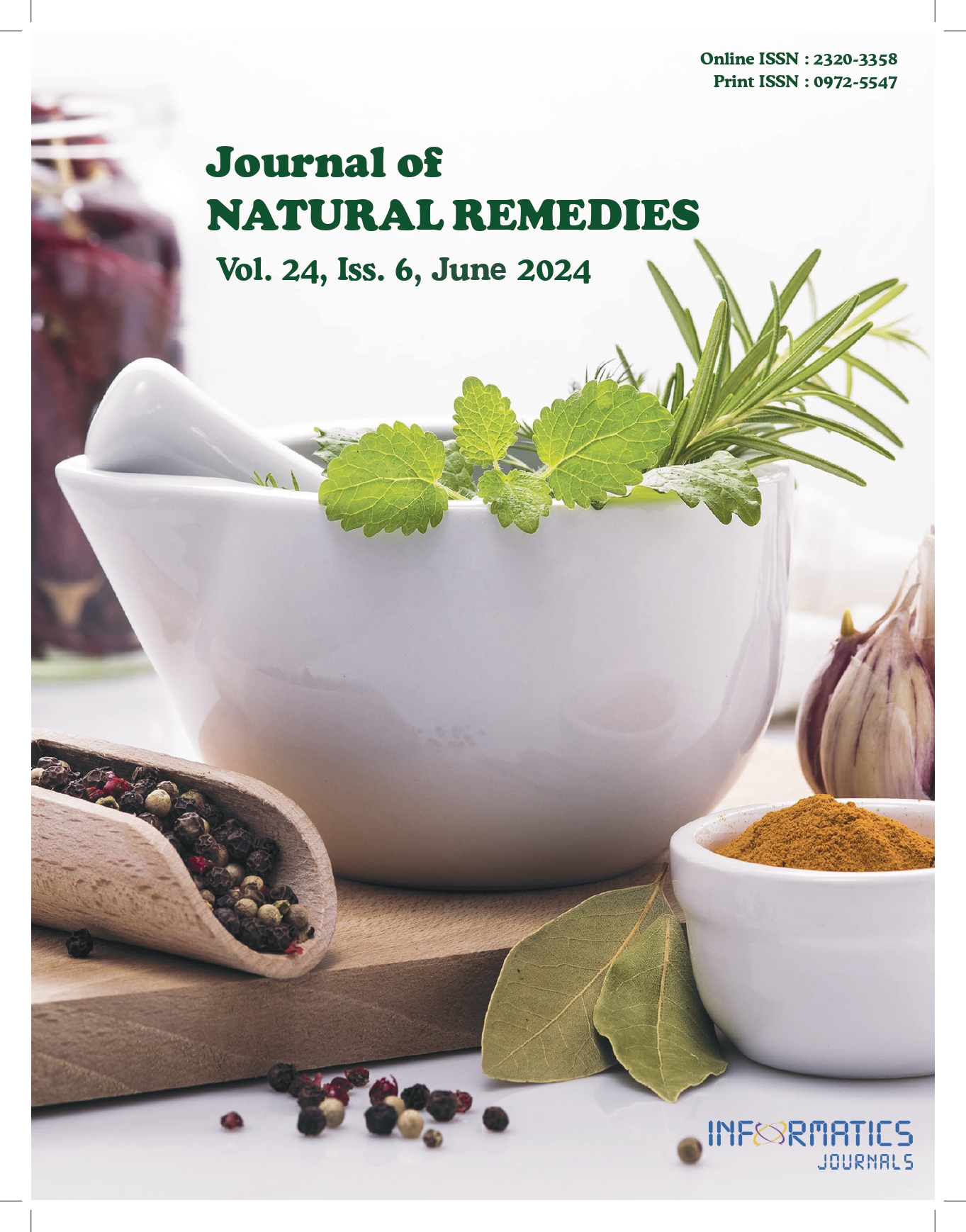Wheatgrass (Triticum aestivum) Extract Reduces Inflammatory TNF-Alpha Response in Experimentally Induced Gastric Ulceration in Rat Model
DOI:
https://doi.org/10.18311/jnr/2024/30528Keywords:
Gastric Ulcer, TNF-α, Triticum aestivum, Ulcer-Index, Wheat Grass ExtractAbstract
Background: The term ‘peptic ulcer’ refers to the ulcers that occur in either the stomach or the first part of the small intestine that leads out of the stomach, called the duodenum. Aim: The present study aims to examine the protective consequence of wheatgrass (Triticum aestivum) extract on ethanol-induced gastric ulceration in Albino Wistar rats. Methods: The extract of wheatgrass significantly reduced gastric ulceration in rats in comparison to the control ethanol group. Results: Consequently, a remarkable decrease in the inflammatory activity of the TNF-α was observed in ethanol-induced ulcerated rats receiving treatment with wheatgrass extract. The gastric volume and ulceration increased with oral administration of ethanol. A drastic decrease in the total acidity and ulcer index was observed in rats treated with wheatgrass extract. In the protective index percentage, a substantial increase was observed with doses of the wheatgrass extract. Conclusion: These results suggest the gastro-protective effect of wheatgrass extract.
Downloads
Metrics
Downloads
Published
How to Cite
Issue
Section
License
Copyright (c) 2024 Sainu Susan Oommen, Hilda Fernandes, Rajendra Holla

This work is licensed under a Creative Commons Attribution 4.0 International License.
Accepted 2024-02-21
Published 2024-06-30
References
Ishida K, Kojima R, Tsuboi M, Tsuda Y, Ito M. Effects of artichoke leaf extract on acute gastric mucosal injury in rats. Biol Pharm Bull. 2010; 33(2):223-9. https://doi.org/10.1248/bpb.33.223 PMid:20118544.
Cho CH, Koo MW, Garg GP, Ogle CW. Stress-induced gastric ulceration: It’s etiology and clinical implications. Scand. J Gastroenterol; 1992; 27(4):257-62. https://doi.org/10.3109/00365529209000071 PMid:1375389.
Vonkeman HE, Klok RM, Postma MJ, Brouwers JR, vande Laar MA. Direct medical costs of serious gastrointestinal ulcers among users of NSAIDs. Drugs Aging. 2007; 24(8):681-90. https://doi.org/10.2165/00002512-200724080-00005 PMid:17702536.
Zabaleta J. Multifactorial etiology of gastric cancer. Methods Mol Biol. 2012; 863:411-35. https://doi.org/10.1007/978-1-61779-612-8_26 PMid:22359309 PMCid: PMC3625139.
Akah PA, Orisakwe OE, Gamanies KS, Shittu A. Effect of some Nigerian folk remedies on peptic ulcer. J Ethnopharmacol. 1998; 62(2):123-7. https://doi.org/10.1016/S0378-8741(98)00060-9 PMid:9741884.
Repetto MG, Llesuy SF. Antioxidant properties of natural compounds used in popular medicine for gastric ulcers. Braz. J Med Biol Res. 2002; 35(5):523-34. https://doi.org/10.1590/S0100-879X2002000500003 PMid:12011936.
Bar-Sela G, Cohen M, Ben-Arye E, Epelbaum R. The medical use of wheatgrass: review of the gap between basic and clinical applications. Mini-Rev Med Chem. 2015; 15(12):1002-10. https://doi.org/10.2174/138955751512150731112836 PMid:26156538.
Hattarki AS, Bogar Chetna. Triticum aestivum (Wheat Grass): A powerhouse plant - A review. DJAS 2017; 5(1):25-9.
Nepali S, Ki HH, Lee JH, Lee HY, Kim DK, Lee YM. Wheatgrass-derived polysaccharide has anti-inflammatory, anti-oxidative and anti-apoptotic effects on LPS-induced hepatic injury in mice. Phytother Res. 2017; 31(7):1107-16. https://doi.org/10.1002/ptr.5835 PMid:28543910.
Durairaj V, Hoda M, Shakya G, Babu SPP, Rajagopalan R. Phytochemical screening and analysis of antioxidant properties of aqueous extract of wheatgrass. Asian Pac J Trop Med. 2014; 7(S1):S398-S404. https://doi.org/10.1016/S1995-7645(14)60265-0 PMid:25312157.
Gore RD, Palaskar SJ, Bartake AR. Wheatgrass: Green blood can help to fight cancer. J Clin Diagn Res. 2017; 11(6): ZC40-42. https://doi.org/10.7860/JCDR/2017/26316.10057 PMid:28764290 PMCid: PMC5534514.
Parit SB, Dawkar VV, Tanpure RS, Pai SR, Chougale AD. Nutritional quality and antioxidant activity of wheatgrass (Triticum aestivum) unwrap by proteome profiling and DPPH and FRAP assays. J Food Sci. 2018; 83(8):2127-39. https://doi.org/10.1111/1750-3841.14224 PMid:30059150.
Boushra AF, Elsayed AM, Ibrahim NA, Abdelwahed MK, Ahmed EI. A comparative study on the possible protective effect of esomeprazole, spirulina and wheatgrass on indomethacin-induced gastric ulcer in male albino rats. Mol Biol Rep. 2019; 46(5):4843-60. https://doi.org/10.1007/s11033-019-04933-1 PMid:31297714.
Carvalho AMS, Heimfarth L, Pereira EWM, Oliveira FS, Menezes IRA, Coutinho HDM, Picot L, Antoniolli AR, Quintans JSS, Quintans-Júnior LJ. Phytol, a chlorophyll component, produces antihyperalgesic, anti-inflammatory and antiarthritic effects: possible NFκB pathway involvement and reduced levels of the proinflammatory cytokines TNF-α and IL-6. J Nat Prod. 2020; 83(4):1107-17. https://doi.org/10.1021/acs.jnatprod.9b01116 PMid:32091204.
Ferruzzi MG, Blakeslee, J. Digestion, absorption, and cancer preventative activity of dietary chlorophyll derivatives. Nutr Res. 2007; 27(1):1-12. https://doi.org/10.1016/j.nutres. 2006.12.003
Ferruzzi MG, Böhm V, Courtney PD, Schwartz SJ. Antioxidant and antimutagenic activity of dietary chlorophyll derivatives determined by radical scavenging and bacterial reverse mutagenesis assays. J Food Sci. 2002; 67(7):2589-95. https://doi.org/10.1111/j.1365-2621.2002.tb08782.x
Breese EJ, Michie CA, Nicholls SW, Murch SH, Williams CB, Domizio P, Walker-Smith JA, MacDonald TT. Tumor necrosis factor alpha-producing cells in the intestinal mucosa of children with inflammatory bowel disease. Gastroenterology. 1994; 106(6):1455-66. https://doi.org/10.1016/0016-5085(94)90398-0 PMid:8194690.
Zelová H, Hošek J. TNF-α signalling and inflammation: interactions between old acquaintances. Inflamm Res. 2013; 62(7):641-51. https://doi.org/10.1007/s00011-013-0633-0 PMid:23685857.
Vogel AI, Tatchell AR, Furnis BS, Hamaford AJ, Smith PWG. Vogel’s textbook of practical organic chemistry: (5th Ed.). The English Book Society and Longman, U.K. 1978. p. 137.
Qiu BS, Cho CH, Ogle CW. Chronic nicotine treatment intensifies gastric ulceration by cold-restraint stress in rats. Agents Actions. 1991; 33(3-4):367-70. https://doi.org/10.1007/BF01986587 PMid:1950822
Sener G, Paskaloglu K, Ayanoglu-dülger. Protective effect of increasing doses of famotidine, omeprazole, lansoprazole, and melatonin against ethanol-induced gastric damage in rats. Indian J Pharmacol. 2004; 36(3):171-4.
Cheng C, Koo M. Effect of Centella asiatica on ethanol-induced gastric mucosal lesions in rats. Life Sci. 2000; 67(21):2647-53. https://doi.org/10.1016/S0024-3205(00)00848-1 PMid:11104366.
Ruder B, Atreya R, Becker C. Tumour necrosis factor-alpha in intestinal homeostasis and gut-related diseases. Int J Mol Sci. 2019; 20(8):1887-92. https://doi.org/10.3390/ijms20081887 PMid:30995806 PMCid: PMC6515381.
Dionne S, Hiscott J, D’Agata I, Duhaime A and Seidman EG. Quantitative PCR analysis of TNF-alpha and IL-1 beta mRNA levels in pediatric IBD mucosal biopsies. Dig Dis Sci. 1997; 42(7):1557-66.
Neurath MF, Fuss I, Pasparakis M, Alexopoulou L, Haralambous S, Meyer Zum Buschenfelde KH, Strober W, Kollias G. Predominant pathogenic role of tumour necrosis factor in experimental colitis in mice. Eur J Immunol. 1997; 27(7):1743-50. https://doi.org/10.1002/eji.1830270722 PMid:9247586.
Wirtz S, Popp V, Kindermann M, Gerlach K, Weigmann B, Fichtner-Feigl S, Neurath MF. Chemically induced mouse models of acute and chronic intestinal inflammation. Nat Protoc. 2017; 12(7):1295-1309. https://doi.org/10.1038/nprot.2017.044 PMid:28569761.

 Sainu Susan Oommen
Sainu Susan Oommen









 0.35
0.35 24
24 0.161
0.161